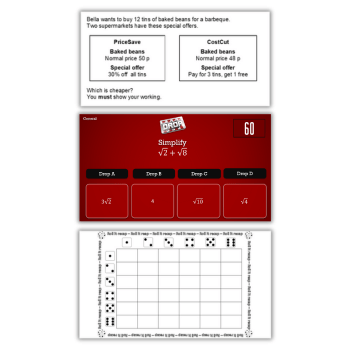Strategies for teaching tricky maths topics

When it comes to teaching those ‘tricky maths topics’ having some departmental strategies in place can make a huge difference, says Richard Coles…

Having been a head of maths for five years I have come across my fair share of topics that we as a department find tricky to deliver, or hard to teach, for varying reasons.
I originally trained as a PE teacher, but breaking my neck playing rugby meant that I needed to change specialism.
I firmly believe that this made me a better maths teacher, because I am able to empathise with students who find the subject hard, breaking down concepts for them in a way I might have neglected to do had I specialised in maths from the beginning.
Here, I would like to outline some strategies I have used to support staff and pupils, and discuss ideas for how to get your department to consider the curriculum, especially areas they find difficult to teach.
It is too difficult for me to pick out a few specific ‘tricky topics’ on your behalf – as you may very well completely disagree with my selections!
Instead, I aim to share approaches to changing the culture of how departments approach teaching tougher topics more generally.
Especially in times where many departments are staffed by non-specialists, unqualified or newly qualified teachers, it is important to have mechanisms in place for discussing curriculum and subject knowledge concerns in an open way, without judgement, and to build systems that develop staff confidence and ‘buy in’ in order to ensure pupils convert their classroom learning to life-long understanding.
So, here are a couple of simple-but-effective strategies that could help:
Resource management
When I stepped into role as head of maths, I started afresh and created what I called ‘The Maths Matrix’.
This was a streamlined resource drive that shares materials for the whole department – see Resource 1 available here – for an example of how this could look. Within this, I wanted to ensure a consistent structure.
This is to reduce cognitive load for students, to ensure they all experience a similar approach across the department, with ‘tricky topics’ broken down carefully through well planned modelling.
The structure ensures the teacher shares the knowledge in different forms by utilising dual coding to provide visual and audio instructions: the teacher explains the topic verbally, modelling it live on the board, or using video modelling from online resources – this is particularly useful if the teacher is less confident in this topic – and then repeats the process, before giving practise time and live feedback.
Resources for all topics, but particularly tricky topics, are carefully planned (ideally through collaboration) using the same structure, so that students experience consistency.
Trending
My mantra has always been that we teach maths, not tricks.
Department time
Meanwhile, I made sure to allocate as much department time as possible to staff for developing teaching and learning. A simple process of: plan together, share how you would deliver, feedback, teach the pupils, reflect, then at the next department time meet again and discuss the outcomes.
I don’t know if it is just us maths teachers, or all departments, but there will often be a culture of ‘I have my way of doing things’ and this can lead to resistance.
At this stage it is essential as the leader that it is explicit that we are not saying there is a right way, or a wrong way, we are just looking for the way that will work best for our students.
We may have used one method successfully for years, but that doesn’t mean it will always work for every group of learners in every school, and it doesn’t mean that there isn’t another way that is even better.
As teachers we should be willing to model life-long learning; after all we expect our pupils to do so. Consistency is key.
What happens if there is not a unified department model for a particular tricky concept, and then a child moves set and is suddenly faced with different ways of doing things?
Or they come to revision before the exam and the teacher uses an acronym they’ve never heard of and their methods become muddled?
Resource 2, also available for download alongside Resource 1, gives a format for approaches that help build a culture for approaching tricky topics through department time.
This works particularly well in July, or at the start of September following the usual final data drops and end of year exams that help to identify which topics students are finding tricky (gap analysis is key).
Staff will naturally disagree on ideas, after all we are all from very different backgrounds and one person’s tricky topic is another person’s favourite! The key thing is to have a system that promotes curriculum and delivery discussion.
9 ‘tricky topic’ approaches to try today
- Growth mindset accompanied by a positive attitude – be outgoing towards every pupil’s success, show you believe in them, build confidence with a ‘can do’ attitude.
- Share your own weaknesses and show how you overcame them; demonstrate that it isn’t always easy but that learning is meant to be a beautiful struggle.
- Use repetition of topics and effective use of maths starters to recap/recall knowledge time and again.
- Focus on the foundations, and aim for no silly mistakes. After all, a complex building will fail if the mortar in the foundations is mixed poorly.
- Use variation theory to ensure pupils will not get tripped up with the working of questions.
- Show your working, voice it out loud, model it on the board – even if you find it easy to do in your head, show your process to students.
- Keep on top of the current expectations for examinations and the examiner report feedback.
- Don’t be afraid to spend more time introducing a topic to get pupils hooked and understanding the content – there’s no point rushing and having to go back later.
- Make it relevant – show students why they are doing something. Link the topic to real life, to jobs, wherever possible.
Richard Coles is an assistant director of sixth form and careers lead at Brockhill Park Performing Arts College school in Kent, an experienced head of maths and teacher. He tweets from @richardcoles10.








